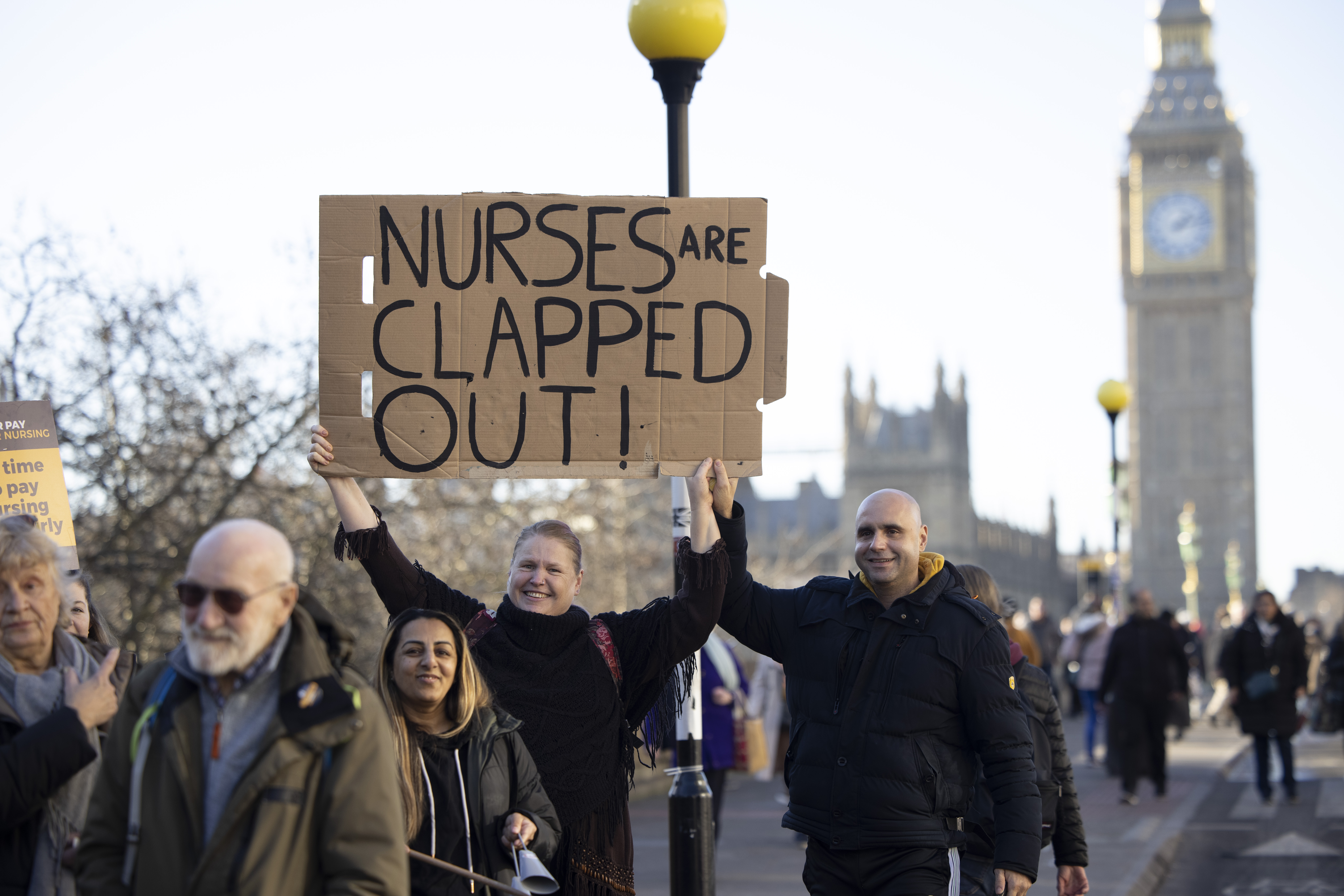Nurses Tell of Disappointment With Latest NHS Pay Offer
‘We’re being fearmongered into accepting this deal.’
by George Walker
6 April 2023

When nurses in a majority of NHS trusts voted to strike against another real terms pay cut last year for the first time since the late 80s, the Royal College of Nursing’s (RCN) union leadership argued for a 19% pay rise to account for both inflation and the effects of a decade of austerity, when NHS worker pay flatlined. “Nursing staff have had enough of being taken for granted, enough of low pay and unsafe staffing levels, enough of not being able to give our patients the care they deserve,” RCN general secretary Pat Cullen said.
Five months, several strikes and a prolonged negotiating period later, nurses have been offered a new pay offer, with lowest paid workers receiving a 10.4% uplift, and the rest of staff just 5%. Also on the table are one-off payments of a 2% uniform payment and a 5% backlog bonus.
The RCN has recommended members take it. In a letter to members, Cullen emphasised the need to accept what is a “final offer”.
Christina McAnea, general secretary of Unison, which represents some nurses and other healthcare workers, wrote to members admitting that “it’s by no means perfect”, but saying that members should nevertheless accept. Unite, representing 100,000 workers across the NHS including many nurses, has taken a different approach, refusing to guide its members on which way to vote.
Voting on the deal for members started on 28 March and is open for just over two weeks, closing on 14 April. However, unions may face an uphill battle getting members to accept the deal.
In reaction to the announcement of the deal, the cross-union group NHS workers Say No mobilised, started a “Vote Reject” campaign to encourage members to reject the deal.
Relations between members and the RCN are getting toxic. This week, the RCN asked the police to investigate some of its own members, after Vote Reject started a petition of no confidence in the RCN leadership. RCN alleges that the petition includes “fraudulent” signatures. Vote Reject campaigners flatly reject this and say only RCN staff would have the means and motivation to tamper with the signatures.
Claire, a nurse working at a hospital in London, said that after taking strike action the proposed deal is a let down. Like all the health workers in this piece, she spoke to Novara Media using a pseudonym to avoid a backlash for her comments. “Honestly, I just feel disappointed” she said. “Strike action was so hard and conflicting, so financially difficult and all just for 5% … It feels really insulting.”
“I voted to reject, as the pay deal is simply not a good one. The fact that the union is trying to sell it to us as one just feels like a betrayal to the members.”
Jane, a nurse working in Warwickshire, said, “My first reaction was that I was surprised and pleased that they’d manage to increase our pay. But then, after speaking to my colleagues and looking into how much I’ll get after tax, I don’t think it’s even a pound more per hour for me.”
It was a difficult decision, but Jane voted to reject the deal. “I was torn because financially times are tough and the thought of that money now enticed me to accept, and I think that’s what the government intended to do with this offer.”
Another nurse working in London, Olivia, said, “I don’t think it’s fair and the government has more to offer us. When this started, they told us we wouldn’t get more than 3% but now suddenly we’ve got 5% – they can afford to give us more.”
“The leadership is awful, we’re effectively being fearmongered into accepting this deal.”
“The government can’t force us to work, so let’s show them by actually going on strike and taking inspiration from the struggles in France – those people know how to strike. Full force, everyone out, and show them how much we are really worth.”
A potential late add-on to the official pay deal surrounds the creation of a separate pay spine for nurses to other workers on Agenda for Change contracts. The notion was suggested in an open letter from Health Secretary Steve Barclay to Pat Cullen, just hours after the formal “Offer in Principle” was made to members on 16 March.
Other health unions are outraged at the prospect of splitting the pay spines of staff within the NHS. The Society and College of Radiographers has argued it would “divide the NHS workforce and further destabilise the NHS”, with the Royal College of Podiatry describing it as “an attempt to drive a wedge between healthcare professions.”
Claire said tactics need to change, “Strike action again may happen but I cannot see it happening soon. In Australia they voted for a total walk-out which was successful in getting the pay offer they deserved.”
“I’m disappointed by the way the talks have been conducted, and it’s clear that they won’t negotiate again soon without strikes. This is not good enough, we as members need to be listened to and the offer needs to be reopened.”
George Walker is a freelance journalist.


